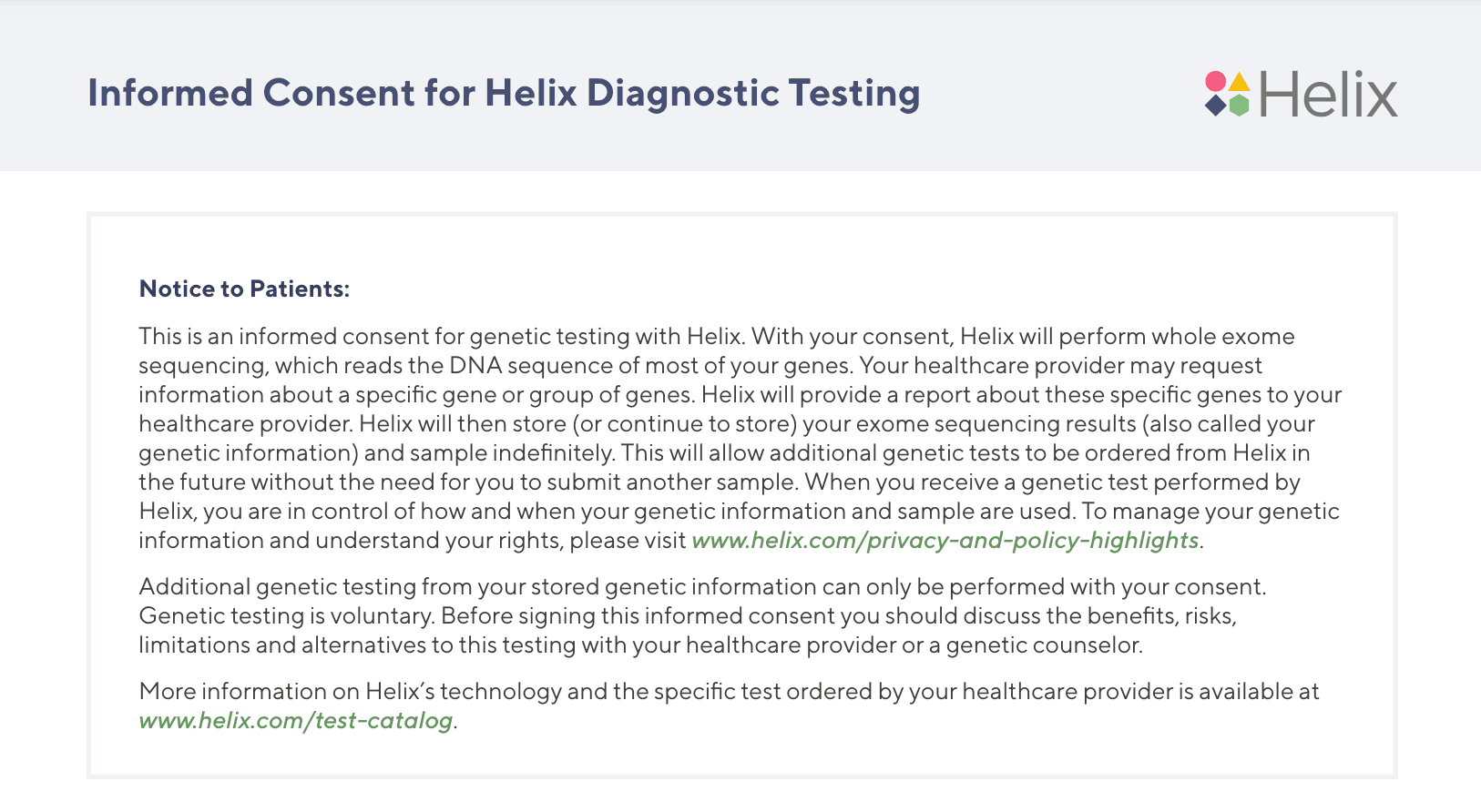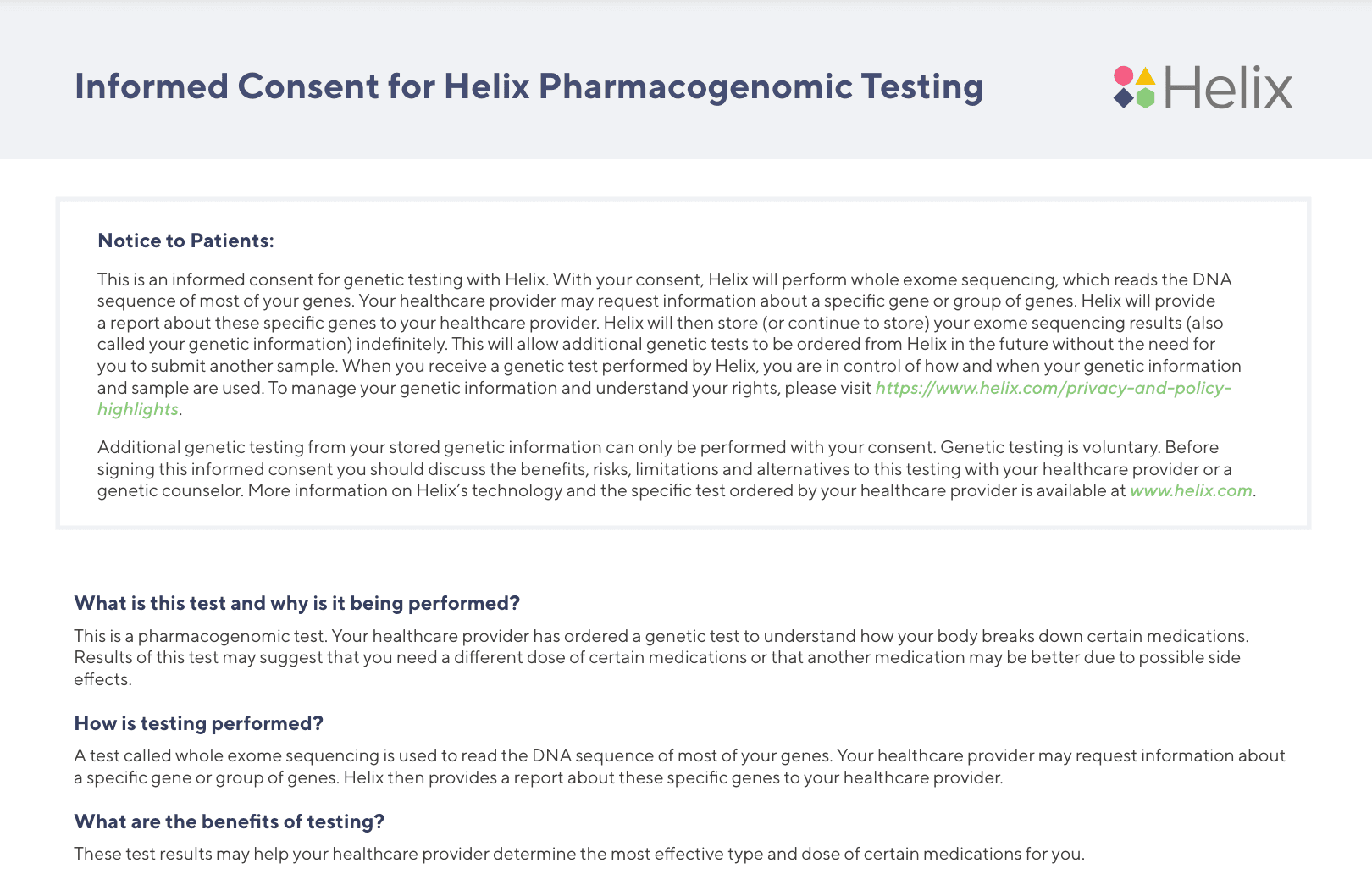
Patient Resources
Genetic insights for informed healthcare decisions
Helix provides you and your healthcare provider with advanced genetic insights to support more personalized care. Our comprehensive genetic testing services offer a deeper understanding of your health, enabling more informed decisions and proactive health management strategies.
Comprehensive genetic testing, simplified
At Helix, we're dedicated to making genetic insights accessible and actionable. Our state-of-the-art sequencing technology and innovative Sequence Once, Query Often® approach allow for a wide range of genetic tests from a single sample. This means you can gain valuable health information over time without repeated sample collection. Whether you're exploring hereditary cancer risks, heart health, medication responses, or family planning, Helix provides the tools to support your healthcare journey.

Diagnostic Testing Patient Resources
How It Works
Consult Your Provider
Discuss if genetic testing is right for you.
Easy Ordering
Your provider can order tests directly.
Simple Sample Collection
Provide a saliva or blood sample.
Comprehensive Analysis
We analyze your sample using advanced sequencing.
Actionable Results
Receive insights to guide your healthcare decisions.
Comprehensive Test Menu
Our wide-ranging test menu includes:

Hereditary Cancer
Understand how your patient’s genetics may facilitate preventative interventions and early detection, as well as identify at-risk family members.

Hereditary Cardiovascular
Understand how your patient’s genetics may inform the diagnosis and management of cardiovascular disorders.

Pharmacogenomics
Understand drug efficacy and the risk of side effects based on your patient’s genetic profile in order to determine optimal prescriptions.

Carrier Screening
Understand your patients' potential to pass on inheritable conditions. Gain insights into a wide range of serious genetic disorders to inform family planning discussions and guide proactive healthcare decisions.

Proactive Screening
Understand how your patient's genes could impact their health so they can be proactively monitored or receive preventive care before developing a serious condition.

Targeted Analyses
Understand your patient's risk for known conditions by evaluating specific, predefined genetic variants, enabling focused interventions and personalized care.
Frequently Asked Questions (FAQs)
Answers for patients who have questions about diagnostic testing.
Billing
Helix accepts Medicare, Medicaid, commercial insurance, and offers a cash-pay price. Additionally, individuals who meet financial criteria may qualify for Helix’s patient financial assistance program or Helix’s monthly payment plan. Payment plans can be arranged by calling 855-699-1933.
Most insurance plans cover genetic testing in the US and Helix is in-network with national and regional US health insurance plans. When your test is complete, Helix submits a claim to your insurance and once processed by your insurance, sends you a statement if you owe anything. If you have any questions regarding eligibility, insurance explanation of benefits (EOB) or your Helix bill, our Billing team is here to help at 855-699-1933.
Medicare and Medicaid beneficiaries may be eligible based on specific criteria. Medicaid recipients owe $0 for covered tests. Those with Medicare or private insurance may be responsible for coinsurance and deductibles. When your test is complete, Helix submits a claim to your insurance and once processed by your insurance, sends you a statement if you owe anything. If you have any questions regarding eligibility, insurance explanation of benefits (EOB) or your Helix bill, our Billing team is here to help at 855-699-1933.
Instructions for how to pay your bill will be included with your statement. Payment can be made online, by phone, or by check.
Upon receiving your sample and insurance information, we will process your test. Once we process your test and bill your insurance company, you may receive an explanation of benefits (EOB) from your insurance company. This is not a bill. If your insurance claim is not paid as expected, Helix will handle the appeals process with your insurance company. If there is an outstanding balance at the end of this process, you will receive a bill from Helix along with instructions on how to pay. Otherwise, often the EOB is merely informative and no action is needed from you.
For those who are uninsured, Helix offers a financial assistance program developed from federal guidelines. Eligibility requirements are determined by the income and household size of the applicant. We also provide a payment plan option that allows for payment to be spread over several months. Please request and submit forms by contacting our Billing team at 844-563-1409 or billing@helix.com.
Insurance
A positive test result indicates an increased risk of developing disease, such as cancer or heart disease. Individuals with an increased risk for these conditions should consult with their healthcare providers to discuss medical management options for prevention or early detection. Health insurance companies may require information about disease risk in order to provide coverage for such medical management.
The Genetic Information Nondiscrimination Act of 2008 (GINA) is a federal law. Title I of GINA makes it illegal for health insurers to use genetic information to determine eligibility or make decisions related to coverage, underwriting or premium-setting. The protections of GINA extend to private health insurance plans, Medicare, Medicaid, Federal Employees Health Benefits, and the Veterans Health Administration. Limited protections are offered for the U.S. Military's TRICARE insurance program.
Genetic test results become part of the patient's medical record. Health insurance companies may request results that are part of a patient's medical record. However, health insurance companies and group health plans are prohibited from using genetic information when making decisions about eligibility for coverage or insurance premiums.
In addition, the Affordable Care Act of 2010 (“ACA”) prohibits health insurance companies from refusing to cover or charging patients more due to a “pre-existing condition.”
While GINA provides protection related to health insurance and employers, GINA does not prohibit providers of life, disability, and long-term care insurance from asking about and using genetic information to make decisions about coverage. Some insurers may require a review of medical information, which may include genetic information that is part of a patient's medical record, prior to making a coverage decision. Some states further restrict how these types of insurers use genetic information, so patients and providers may want to learn more about laws in their state. If patients already have a life, disability, or long-term care policy, new information about their health (including genetic information) generally may not be used to deny continuing coverage under those policies.
GINA makes it illegal for employers to make decisions about whether to hire or fire employees based on genetic information. The law also prohibits labor organizations from discriminating against an individual based on genetic information. Note: GINA’s employment protections do not extend to all employees or in all circumstances. To learn more about GINA and additional federal and state protections, please visit the following websites:
https://www.genome.gov/about-genomics/policy-issues/Genetic-Discrimination
https://geneticalliance.org/policy/genetic-discrimination
http://www.ginahelp.org/
While the federal law GINA provides protection related to health insurance and employers, GINA does not prohibit providers of life, disability, and long-term care insurance from asking about and using genetic information to make coverage decisions. Some insurers may require a review of medical information, which may include genetic information that is part of a patient's medical record, prior to making a coverage decision. Some states further restrict how these types of insurers use genetic information, so patients and providers may want to learn more about laws in their state. If a patient already has a life, disability, or long-term care policy, new information about their health (including genetic information) generally may not be used to deny continuing coverage under those policies.
To learn more about GINA and additional federal and state protections, please visit the following websites:
https://www.genome.gov/about-genomics/policy-issues/Genetic-Discrimination
https://geneticalliance.org/policy/genetic-discrimination
http://www.ginahelp.org/
Genetic Testing and Results
Genetic testing involves the analysis of your genes, which carry the instructions embedded in your DNA. These genetic instructions influence traits such as hair and eye color, as well as your height and other distinctive features. Scientists analyze your genes during genetic testing to find small variations that could be connected to health conditions. Genetic testing is often performed to confirm suspected disease or to understand why certain health conditions are present in a family.
All of Helix's tests must be ordered by a provider. If you would like your health care provider to order diagnostic testing for you, please direct them to our Customer Support staff at 844-211-2070 to get the process started.
Once your test has been ordered, you will need to provide a blood or a saliva sample. Your health care provider can help arrange this at their office.
After Helix receives your sample and your doctor's test order, Helix uses specialized lab equipment to isolate the DNA, which holds your genetic information. Your DNA undergoes a detailed preparation process and is analyzed using advanced technology called exome sequencing. Helix reads each gene multiple times to gather accurate data about possible genetic changes related to known diseases. Scientists review the data and create a report with the results. Helix then sends the report to your health care provider, who will share it with you.
Yes, all of Helix’s tests have New York State approval.
A genetic counselor is a healthcare provider with specialized training in medical genetics and counseling. Genetic counselors can help translate test results, help participants understand how their personal and family medical history impacts their health, and guide next steps in medical management. They can also help navigate how to speak with relatives about health risks that may run in the family. Genetic counseling visits are typically scheduled for one hour, but may take more or less time depending upon the specifics of an individual's results and the questions that they have.
Choosing the best genetic test for you involves looking at your medical and family histories, your current health situation, and the specific information you and your healthcare provider are looking for. Talk with your health care provider to decide which type of genetic testing might be the most suitable for your needs.
When a sample fails processing, a TNP (test not performed) result is returned to the electronic medical record. A member of your health system staff will reach out to arrange submission of a new specimen.
The time it takes to receive results varies but is typically within 7 to 24 days for diagnostic tests and 7 to 10 days for PGx. If you’ve had a DNA sample already sequenced by Helix, no sample is required and test results will be returned within 1 to 14 days for diagnostic tests and < 5 minutes for PGx. Results are returned directly to your electronic medical record and sent to your provider to review with you.
There are three types of genetic test results.
A positive result means that a disease-causing variant has been found. Lifetime risk of developing disease is higher compared to the general population. Exact risks vary by gene. A positive result may explain why disease occurred and may impact medical management. For those who have not been diagnosed, a positive result can help clarify their future risk of disease and guide next steps in medical care. Sometimes a positive result indicates that someone is a "carrier." Carriers do not have increased personal risk of disease, but this type of result may impact the risk to their children.
A negative result means that no disease-causing variants were found in the genes that were tested. Personal and family medical history should be used to guide next steps. It is important to remember that inherited genetic variants are just one cause of disease. Other causes may include aging, lifestyle factors, exposures and other genetic influences.
An indeterminant result means that a variant of uncertain significance has been found. This type of result is common. It means that we do not have enough information about a specific variant to know whether it causes disease. Such variants should not be used to guide medical decision-making. Personal and family medical history should be used to guide next steps.
An individual's DNA sequence does not change over time. However, with every Helix test performed, genetic variants of uncertain significance (VUS) are identified. A VUS means that a genetic variant was found but its impact on disease is uncertain. Further research and evidence are needed to determine the exact impact of the variant on health. Variant reclassifications occur as a result of ongoing research, improved understanding of genetic data and advances in the field of genetics. When variants are reclassified, Helix will provide detailed information regarding the revised reclassification to the ordering clinician, including specific reasons behind the change and potential medical implications.
Positive genetic test results can have implications for family members. Here are some important points to consider:
- Familial risk assessment: A positive genetic test result indicates the presence of a genetic variant that increases the risk of developing a certain condition. This information is valuable for family members as they may also have an increased risk of carrying the same variant. A genetic counselor can provide guidance on how to share this information with family members and may recommend that they consider genetic testing as well.
- Inheritance pattern: Many genetic variants can be inherited in an autosomal dominant pattern. This means that there is a 50% chance for each biological child, sibling and parent to inherit the variant. A genetic counselor can explain the inheritance pattern in detail and discuss the implications for family members.
- Genetic testing for family members: Family members can undergo targeted genetic testing to determine if they carry the same variant. Genetic counseling can help guide them through the testing process and provide information about the potential risks associated with the variant.
- Screening and management recommendations: A positive genetic test result may lead to screening recommendations for family members who test positive. This may include early or increased surveillance or screening. A genetic counselor can provide specific recommendations based on a specific variant and family history.
- Reproductive decisions: For family members considering starting or expanding their families, a positive genetic test result may influence their reproductive decisions. They may choose to undergo preimplantation genetic diagnosis (PGD) to select embryos without the variant or consider other reproductive options. Genetic counselors can provide information and support to individuals making these decisions.
The decision to pursue genetic testing or any medical management options should be made on an individual basis and with the guidance of healthcare professionals. Genetic counseling plays an important role in educating and supporting both patients and their family members, helping everyone make informed decisions about their healthcare and potential genetic risks. Genetic counselors (in-person or virtual) can be identified at www.findageneticcounselor.org.
When a participant tests positive for a pathogenic (or disease-causing) variant, their close family members (including parents, siblings and children) have a 50% chance of testing positive and having an increased risk of disease. More distant relatives may also be at risk. It is recommended that positive genetic test results be shared with family members who can discuss the option of testing with their healthcare providers or with a genetic counselor.
Family variant testing (FVT) is a type of genetic testing that can determine whether family members have inherited a known genetic variant. It is commonly used when a family member has tested positive for a genetic variant, and other relatives want to assess their risk of having the same variant. FVT is available to any individual who has a blood relative with a Pathogenic or Likely Pathogenic result, and can be added to any Helix diagnostic or screening test at no additional cost.
FVT is also available at no additional cost when it is ordered as a standalone test, if: 1) the original patient was a blood relative that was tested by us, and 2) the FVT is ordered within 90 days of issuance of the original patient’s test report.
Keeping your information private and secure is important to us. We comply with all applicable federal and state privacy laws and regularly perform third party assessments of our security and privacy programs to ensure they are operating effectively. For details on how we protect your information, please visit our Privacy and Policy Highlights page.









